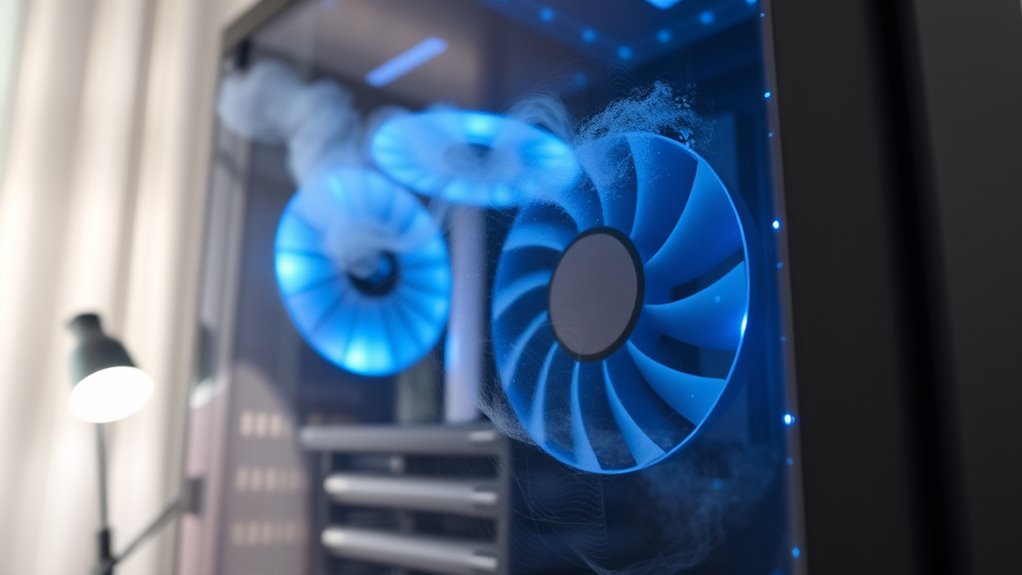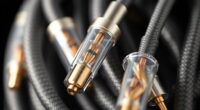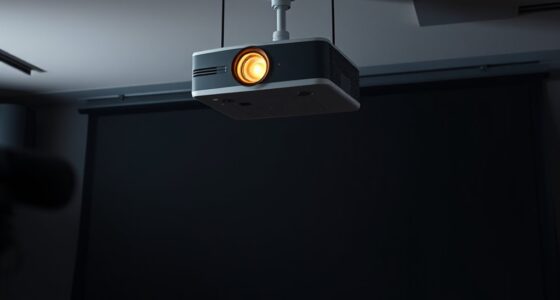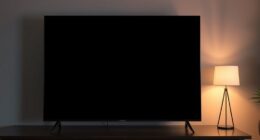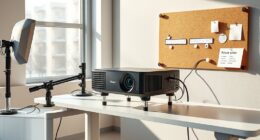Fan noise and heat may seem minor, but they can silently cause high energy bills, shorten your hardware’s lifespan, and lead to costly repairs. Overworking fans wastes electricity and accelerates component wear, while poor cooling allows heat to damage sensitive parts. By managing airflow, choosing quiet components, and maintaining your system, you can prevent these hidden costs. Staying proactive now helps you save money and prolong your PC’s life—discover how to do it effectively.
Key Takeaways
- Excessive fan noise causes frustration, reduced productivity, and can lead to hearing discomfort over time.
- Poor cooling increases energy consumption, raising electricity bills and environmental impact.
- Overheating accelerates hardware wear, risking early component failure and costly repairs.
- Inadequate airflow management can create hotspots, damaging sensitive components and shortening device lifespan.
- Investing in proper airflow solutions and quiet cooling methods reduces long-term costs and improves user experience.
Understanding the Impact of Excessive Fan Noise
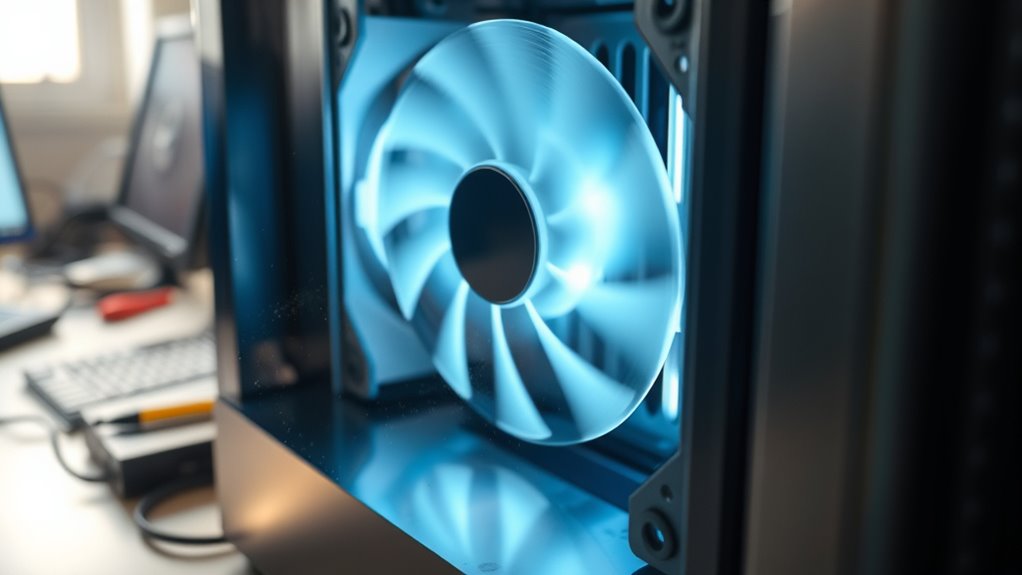
Excessive fan noise isn’t just a minor annoyance; it can substantially impact your concentration and overall comfort. When your PC’s fans produce loud, persistent sounds, fan resonance amplifies the noise, making it harder to focus. This constant din can cause frustration and distract you from work or gaming. Noise cancellation methods help reduce this disturbance, but they aren’t always enough to eliminate the problem entirely. The more your fans vibrate and resonate, the louder and more disruptive the noise becomes. Recognizing how fan resonance contributes to noise levels is key to managing it effectively. For example, using headphones can help block out some of the ambient noise and improve your listening experience. By understanding the impact of excessive fan noise, you can take steps to minimize its effects and create a more comfortable, quieter environment.
How Heat Can Reduce Your PC’s Lifespan
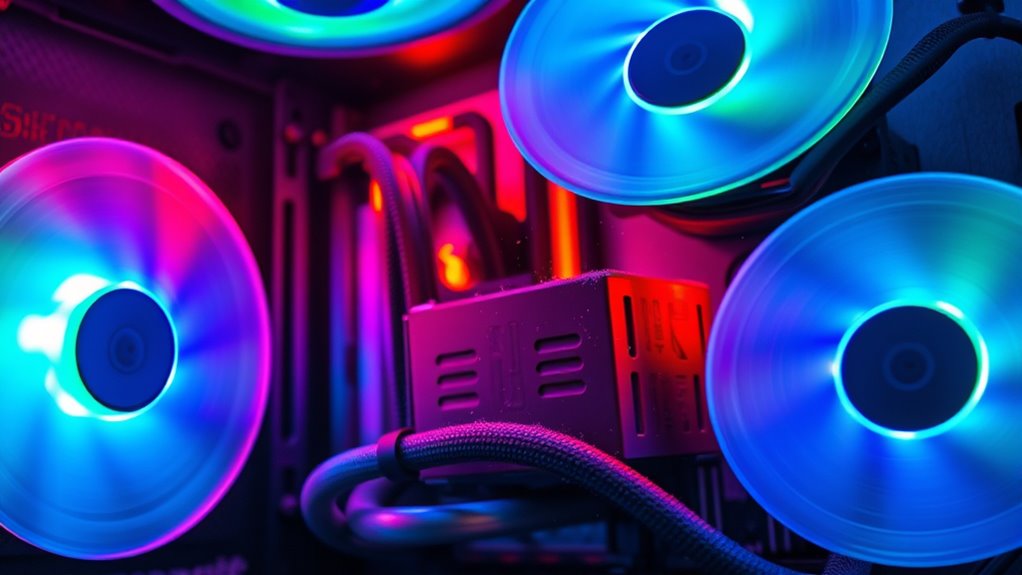
When your PC gets too hot, its components wear out faster and may fail sooner than expected. Excessive heat causes thermal stress, which can damage delicate parts over time. As a result, your hardware becomes less efficient and more prone to problems, shortening its lifespan. Utilizing Vibe coding techniques can help optimize cooling strategies and prevent overheating issues.
Accelerated Component Wear
Heat accelerates the wear and tear of your PC’s components, leading to a shorter lifespan. When cooling isn’t effective, parts like the CPU, GPU, and motherboard degrade faster. Poor ventilation design hampers airflow optimization, causing hot spots that stress components. This constant heat fatigue can lead to premature failures and costly replacements. To prevent this, guarantee your case promotes good airflow and keeps temperatures in check. Proper ventilation design helps dissipate heat efficiently, reducing thermal stress. Here’s a quick comparison:
| Factor | Impact on Component Wear |
|---|---|
| Ventilation Design | Enhances airflow, lowers heat buildup |
| Airflow Optimization | Ensures consistent cooling, prolongs lifespan |
| Hot Spots | Increase localized wear |
| Overheating | Accelerates component fatigue |
Maintaining proper airflow is vital for longevity, especially since deforestation can lead to increased heat and reduced natural cooling, impacting your PC’s temperature regulation.
Increased Thermal Stress
As your PC operates under high temperatures, the thermal stress on its components increases considerably. This elevated heat causes thermal fatigue, which weakens the materials inside your hardware over time. Repeated heating and cooling cycles lead to microscopic cracks and material fatigue, accelerating component degradation. When components like the CPU, GPU, or motherboard experience sustained high temperatures, their lifespan shortens as internal parts become less reliable. Over time, this increased thermal stress can cause system instability, unexpected failures, and costly repairs. To avoid these issues, keeping temperatures in check not only improves performance but also prolongs your PC’s lifespan. Managing heat effectively limits thermal fatigue and reduces the risk of premature component degradation, ensuring your system remains reliable longer.
Reduced Hardware Efficiency
Excessive heat directly hampers your PC’s hardware efficiency, causing components to run slower and less reliably. When temperatures rise beyond ideal levels, hardware degradation accelerates, reducing the lifespan of your parts. Overheating can lead to thermal throttling, where your CPU or GPU slows down to prevent damage, which diminishes performance during critical tasks. To avoid this, focus on airflow optimization inside your case. Proper cable management and strategic fan placement promote better airflow, dispersing heat more effectively. When your system stays cooler, your components operate at peak efficiency and last longer. Additionally, implementing encryption solutions can help protect sensitive data from being compromised, especially if your hardware is vulnerable due to overheating. Ignoring heat management not only impacts performance now but also risks long-term hardware failure, leading to costly replacements. Maintaining a well-ventilated setup is essential to preserving your PC’s health and efficiency.
Hidden Costs of Inefficient Cooling Systems
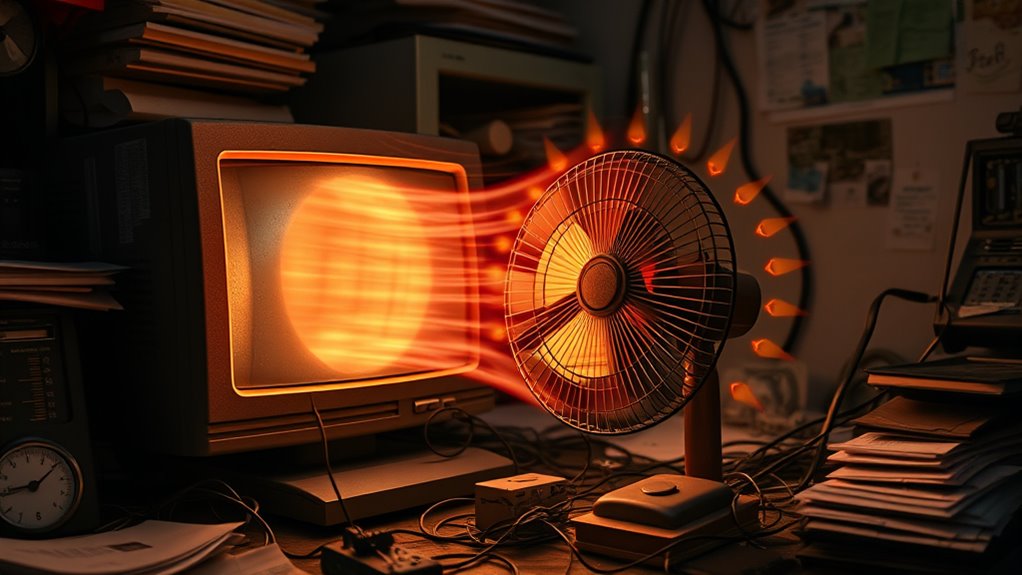
Inefficient cooling systems can silently drain your wallet, leading to higher energy bills and unnecessary expenses. When your system isn’t optimized for airflow, it works harder than needed, wasting energy and increasing costs. Poor airflow often results from clogged filters, obstructions, or poorly placed fans, which hinder passive cooling methods. By focusing on airflow optimization, you can reduce the load on active cooling devices, lowering energy consumption and extending hardware lifespan. Passive cooling techniques, like proper ventilation and strategic placement of components, help maintain a stable temperature naturally. Investing in efficient airflow management minimizes the need for constant fan operation, saving you money and reducing heat-related wear and tear. Additionally, choosing the right airless paint sprayer and accessories can help ensure consistent performance and reduce waste, further supporting energy efficiency. In short, smarter cooling means less money spent on energy and fewer heat-related problems.
The Electricity Expense of Overworking Fans and Cooling
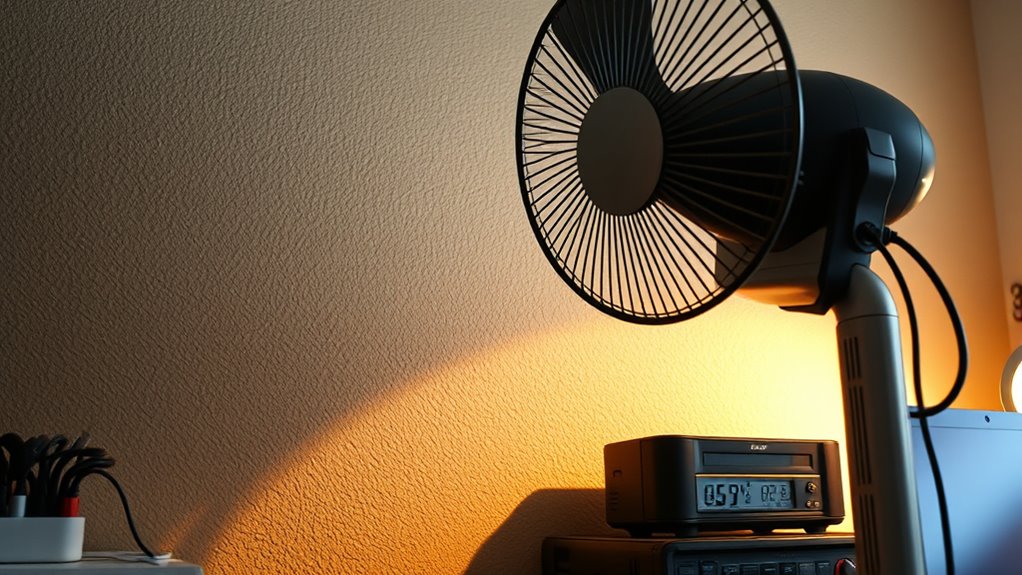
When you keep fans running constantly or set your cooling systems too low, your energy use skyrockets. This extra effort not only wastes power but also leads to higher utility bills each month. Understanding these costs can help you find smarter ways to stay cool without overspending. Additionally, using proper tuning techniques can optimize your cooling systems for energy efficiency.
Increased Energy Consumption
As you rely more on fans and cooling devices to keep your space comfortable, your energy bills can start to climb unexpectedly. Running fans constantly or using inefficient cooling methods leads to energy waste, increasing your overall power drain. Overworking these devices consumes more electricity than necessary, which not only raises costs but also strains your power system. This unnecessary energy use can contribute to environmental impact as well, since more power often means more fossil fuel consumption. To avoid this, set your fans to ideal speeds, use timers, and ensure your cooling devices are energy-efficient. Being mindful of how long and how often you run your fans helps reduce hidden energy costs and keeps your power consumption in check. Additionally, understanding how contrast ratio influences your cooling efficiency can help you optimize your setup for better energy use.
Higher Utility Bills
Overworking fans and cooling devices can considerably boost your utility bills. When you run them excessively, your energy consumption skyrockets, leading to higher costs. To avoid this, consider energy efficient upgrades like programmable thermostats and ENERGY STAR-rated fans. These reduce unnecessary usage without sacrificing comfort. Implement noise reduction techniques, such as placing fans on vibration pads or using quieter models, which can help you run fans more efficiently and less frequently. Proper maintenance, like cleaning filters and vents, also improves performance and reduces energy waste. Additionally, understanding power consumption of your cooling equipment can help you make smarter choices about usage and upgrades. By making smart choices, you can cut down on electricity expenses while keeping noise levels manageable. Staying mindful of your cooling habits and investing in efficient equipment ultimately helps you save money and creates a quieter, more comfortable environment.
Identifying Signs of Overheating and Noisy Fans
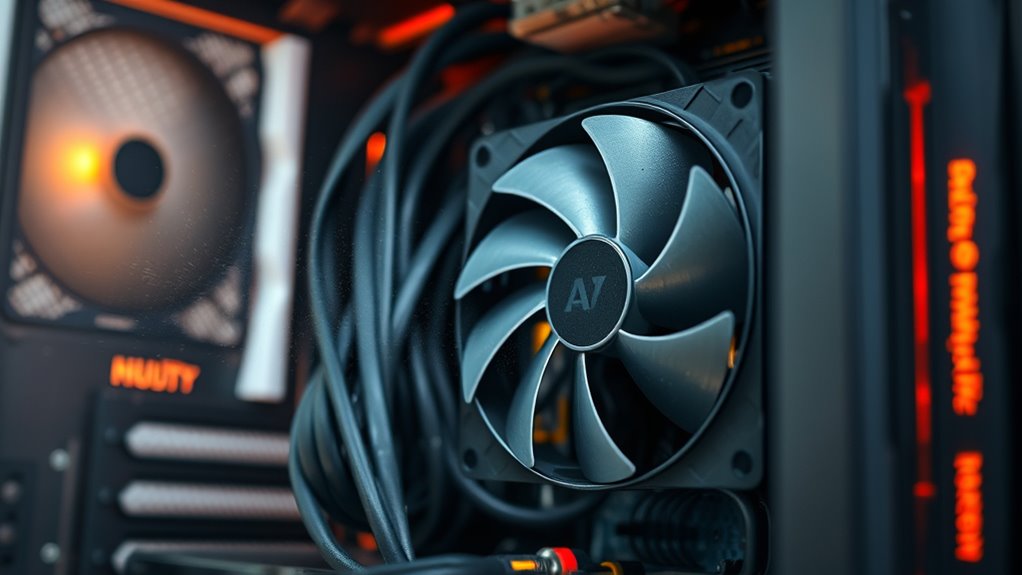
Detecting early signs of overheating and noisy fans is essential to prevent hardware damage. Pay attention to unusual sounds, like rattling or grinding, which may indicate a fan struggling to operate smoothly. Feel if your device is unexpectedly hot, especially around vents and ports. Poor fan placement can cause uneven cooling, leading to hotspots and increased noise. Additionally, inadequate noise insulation might amplify fan sounds, making issues more noticeable. Watch for frequent fan cycles or constant high-speed operation, as these suggest your system is working harder than necessary. Regularly cleaning vents and ensuring proper fan placement helps reduce strain. Recognizing these signs early allows you to address potential problems before they cause more serious damage or costly repairs. Being aware of fan efficiency can help you identify when your system’s cooling performance is compromised.
Cost-Effective Strategies to Minimize Heat and Noise
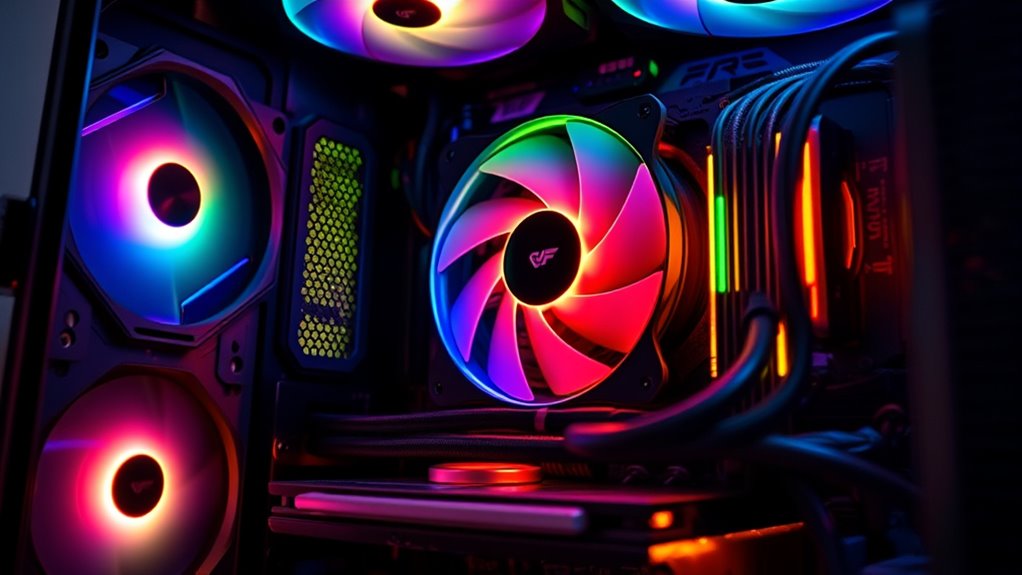
To reduce heat and noise on a budget, start by keeping your device’s vents clean and free of dust, which can obstruct airflow and cause fans to work harder. Next, focus on airflow optimization by ensuring your PC is positioned in a cool, well-ventilated area. Proper fan placement is essential; position fans to promote smooth airflow, such as intake at the front and exhaust at the rear. Additionally, consider adjusting fan speeds through software to balance cooling and noise levels. Finally, tidy up cables inside your case to prevent airflow blockages. These simple steps can markedly lower heat and noise without costly upgrades, prolonging your device’s lifespan and improving your overall experience. Engaging with industry trends can also help you stay informed about new, affordable cooling solutions.
Choosing the Right Components for Quiet and Cool Operation
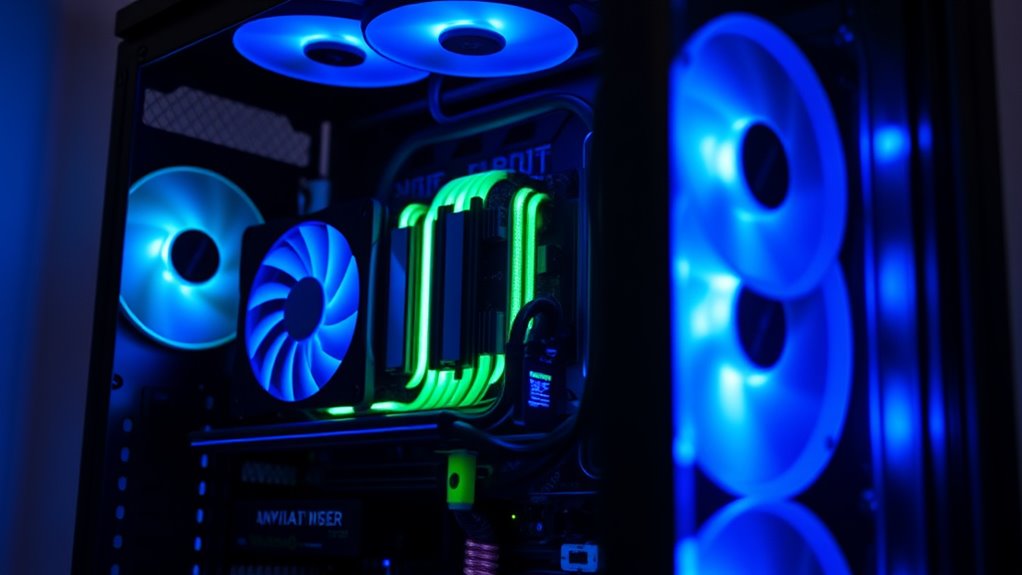
Choosing the right components is a key step in ensuring your system runs quietly and stays cool. Focus on airflow optimization by selecting case fans and CPU coolers designed for silent cooling. High-quality fans with larger blades can move more air at lower RPMs, reducing noise. Opt for a well-ventilated case with strategic airflow paths to prevent hot spots and improve heat dissipation. Choose a power supply with efficient, quiet operation, and consider liquid cooling solutions if you want ultra-silent performance. When building or upgrading, prioritize components known for low noise levels and effective heat management. Proper airflow and quiet cooling components work together to minimize fan noise, keeping your system cool without disturbing your environment.
Frequently Asked Questions
How Do Fan Noise Levels Affect Daily Productivity?
Fan noise levels can considerably impact your daily productivity by causing noise distraction and focus impairment. When the fan is loud, it’s harder to concentrate on tasks, leading to mistakes and slower progress. You might find yourself constantly adjusting or becoming frustrated. To stay productive, opt for quieter fans or use noise-canceling tools. Managing noise levels helps you maintain focus and work more efficiently throughout your day.
Are There Specific Components More Prone to Heat Damage?
A stitch in time saves nine. Components like CPUs, GPUs, and power supplies are more prone to heat damage, especially around thermal hotspots. Excessive heat can cause component failure, reducing lifespan and risking costly repairs. Keep an eye on cooling systems, guarantee proper airflow, and monitor temperatures regularly. By maintaining ideal thermal conditions, you prevent damage and extend the longevity of your system’s critical components.
What Are the Long-Term Financial Impacts of Inefficient Cooling?
Inefficient cooling can markedly increase your energy bills over time, reducing your overall cost savings. When your system isn’t energy-efficient, it consumes more electricity, leading to higher expenses and potential wear on components. This long-term financial impact also includes costly repairs or replacements due to heat damage. To avoid these issues, invest in efficient cooling solutions, which help lower energy costs and extend your system’s lifespan.
Can Overcooling Cause Additional Costs or Issues?
Ever imagine your energy bills skyrocketing just because you overcool? Overcooling risks include unnecessary energy waste and potential equipment wear. It can lead to higher costs, increased power consumption, and even discomfort. So, do you want to pay extra for cooling that’s more than you need? Adjust your thermostat wisely to avoid these issues, ensuring efficient cooling without wasting energy or money.
How Often Should Cooling Systems Be Maintained to Prevent Hidden Costs?
You should schedule maintenance for your cooling system at least twice a year, ideally in spring and fall. Follow a regular cleaning frequency, like monthly, to keep filters and vents clear. Regular maintenance helps prevent hidden costs by improving efficiency, reducing noise, and avoiding overheating issues. Sticking to this schedule guarantees your system runs smoothly, saves energy, and extends its lifespan—saving you money in the long run.
Conclusion
Think of your PC as a garden: neglect the watering and it withers, just like ignoring heat and noise can shorten your system’s life. I once ignored my noisy fans, only to find my CPU was overheating and my wallet draining from higher electricity bills. By choosing efficient components and monitoring temps, you protect your investment like tending a delicate plant. Stay vigilant, and your PC will flourish quietly and reliably for years to come.
